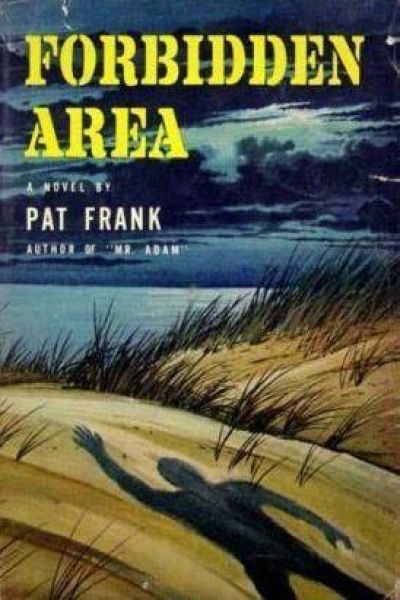Lost Voices 19: Forbidden Area by Pat Frank
Forbidden Area
By Pat Frank

7 May, 2000
0 comments
Forbidden Area
Pat Frank
Bantam Books, 1956
213 pages
Synopsis: The Soviets are being pressured by their Chinese allies and by their domestic populations to resolve the Cold War. Narrowly averting a Chinese attack on Formosa, they promise that they have a plan for neutralising the USA. That this must done quickly is obvious, before the bomber fleets are made obsolete by ICBMs. Once the ICBMs are deployed by the USA, it will be impossible to contemplate a successful war on the US. Submarines and Russian bombers can kill most of SAC’s resources, it is felt, except for the planes too far away from the USSR, which must be sabotaged. Four agents are sent to the US to infiltrate SAC and place bombs on the B‑99s, the latest model. It is hoped that if enough planes crash mysteriously, the US will ground the B‑99 and temporarily replace them with older, inferior models of bomber which the Russian believe their air-defenses will handle. This should, the Russians hope, allow them to achieve a 75% kill of the US population on the first strike.
At the same time, the Intentions Group, a multi-departmental think tank in the pentagon, begins to deduce the Soviets are planning something big for Christmas Eve. They are unable to convince their superior office of this, who does not believe nuclear weapons will figure into the next real war, as gas did not figure into battlefield conflicts between the Great Powers in WWII [The Unpleasantness in Italy aside]. Most of them attempt to find alternate ways to go over their superior’s head but one of them, from a Southern Old Money family, opts to run off a country estate he thinks he can use to live through the coming war.
B‑99s start falling out of the air. There is pressure from the relatives of aircrewmen serving on B‑99s to pull them from service until the cause of the crashes is found. A hint is acquired when a crewman lives through a crash: his clothes have traces of explosive on them. There is a good but not compelling case for sabotage [The explosive is of a sort found in the plane’s weapons].
Several lines of investigation pay off: a young couple saw the saboteurs come ashore and finally tell the authorities. A banker whose family has worked closely and secretly with the Russians panics and runs off to Cuba. He is rolled by a prostitute and makes the error of telling the Cuban cops, who alert the FBI. Eventually, he breaks under interrogation and tells the FBI agents a bit before succumbing to a heart attack. One of the saboteurs is betrayed by circumstance, his girl friend’s car and the happenstance that the method of sabotage is the same as used against US planes in Italy during WWII. Three of the four saboteurs are caught, the fourth having apparently taken his seed money and quietly assimilated into US society rather than chance the risky plan of the Russians.
The US military starts hunting and killing Russian “V1 and V2-style” missile equipped subs [SLBMs and cruise missiles, in modern terms]. The President makes a general announcement about the possibility of a Christmas Eve attack. The cities are evacuated, about smoothly as one might hope for. The cowardly Southern gentleman finds himself sharing his home with his neighbors, who have noticed his preparations and who are willing to allow him to share. The Russians back down, purging the entire Presidium. The US considers nuking the SU into oblivion but refrains, on the humanitarian grounds. The possibility of more peaceful and open relations is put forth and, in any case, the glorious age of the ICBM is beginning, forever ridding the world of the threat of nuclear war.
Pat Frank is better known for Alas, Babylon , a nuclear war tale set in Florida. Forbidden Area is not as good, dragging at times but it does have some strengths: the lead female character comes closest to multidimensionality, and her desire for a career is interestingly handled, although all that is thrown away on a trite and routine ‘gets married happily ever after’ ending. It might make an interesting movie, being simple enough to be adaptable to that medium.
FA is obviously a product of a very specific period in world history. I don’t see this as a weakness. While it doesn’t have the quaint expressions of liberalism of Alas, Babylon it does have its own unique take on certain issues: I think this may be the only book I have read where the ICBM is seen as a liberating technology in its original purpose. The Russian plan is implausible, even as the product of a government with its back to the wall, but not any more implausible than plots of more recent thrillers like The Fourth Protocol.
Pat Frank wrote three books of interest to SF readers: this one, Alas, Babylon , and Mr. Adam . Pat Frank died in 1964, ending his career.
Next: The Space Egg, Russ Winterbotham
